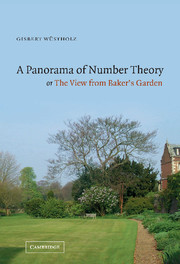Book contents
- Frontmatter
- Contents
- Contributors
- Introduction
- 1 One Century of Logarithmic Forms
- 2 Report on p-adic Logarithmic Forms
- 3 Recent Progress on Linear Forms in Elliptic Logarithms
- 4 Solving Diophantine Equations by Baker's Theory
- 5 Baker's Method and Modular Curves
- 6 Application of the André–Oort Conjecture to some Questions in Transcendence
- 7 Regular Dessins, Endomorphisms of Jacobians, and Transcendence
- 8 Maass Cusp Forms with Integer Coefficients
- 9 Modular Forms, Elliptic Curves and the ABC-Conjecture
- 10 On the Algebraic Independence of Numbers
- 11 Ideal Lattices
- 12 Integral Points and Mordell–Weil Lattices
- 13 Forty Years of Effective Results in Diophantine Theory
- 14 Points on Subvarieties of Tori
- 15 A New Application of Diophantine Approximations
- 16 Search Bounds for Diophantine Equations
- 17 Regular Systems, Ubiquity and Diophantine Approximation
- 18 Diophantine Approximation, Lattices and Flows on Homogeneous Spaces
- 19 On Linear Ternary Equations with Prime Variables – Baker's Constant and Vinogradov's Bound
- 20 Powers in Arithmetic Progression
- 21 On the Greatest Common Divisor of Two Univariate Polynomials, I
- 22 Heilbronn's Exponential Sum and Transcendence Theory
1 - One Century of Logarithmic Forms
Published online by Cambridge University Press: 20 August 2009
- Frontmatter
- Contents
- Contributors
- Introduction
- 1 One Century of Logarithmic Forms
- 2 Report on p-adic Logarithmic Forms
- 3 Recent Progress on Linear Forms in Elliptic Logarithms
- 4 Solving Diophantine Equations by Baker's Theory
- 5 Baker's Method and Modular Curves
- 6 Application of the André–Oort Conjecture to some Questions in Transcendence
- 7 Regular Dessins, Endomorphisms of Jacobians, and Transcendence
- 8 Maass Cusp Forms with Integer Coefficients
- 9 Modular Forms, Elliptic Curves and the ABC-Conjecture
- 10 On the Algebraic Independence of Numbers
- 11 Ideal Lattices
- 12 Integral Points and Mordell–Weil Lattices
- 13 Forty Years of Effective Results in Diophantine Theory
- 14 Points on Subvarieties of Tori
- 15 A New Application of Diophantine Approximations
- 16 Search Bounds for Diophantine Equations
- 17 Regular Systems, Ubiquity and Diophantine Approximation
- 18 Diophantine Approximation, Lattices and Flows on Homogeneous Spaces
- 19 On Linear Ternary Equations with Prime Variables – Baker's Constant and Vinogradov's Bound
- 20 Powers in Arithmetic Progression
- 21 On the Greatest Common Divisor of Two Univariate Polynomials, I
- 22 Heilbronn's Exponential Sum and Transcendence Theory
Summary
Introduction
At the turn of any century it is very natural on the one hand for us to look back and see what were great achievements in mathematics and on the other to look forward and speculate about which directions mathematics might take. One hundred years ago Hilbert was in a similar situation and he raised on that occasion a famous list of 23 problems that he believed would be very significant for the future development of the subject. Hilbert's article on future problems in mathematics published in the Comptes Rendus du Deuxième Congrès International des Mathématiciens stimulated tremendous results and an enormous blossoming of the mathematical sciences overall. A significant part of Hilbert's discussion was devoted to number theory and Diophantine geometry and we have seen some wonderful achievements in these fields since then. In this survey, we shall recall how transcendence and arithmetical geometry have grown into beautiful and far-reaching theories which now enhance many different aspects of mathematics. Very surprisingly three of Hilbert's problems, which at first seemed very distant from each other, have now come together and have provided the catalyst for a vast interplay between the subjects in question. We shall concentrate on one of them, namely the seventh, and describe the principal developments in transcendence theory which it has initiated. This will lead us to the theory of linear forms in logarithms and to the generalization of the latter in the context of commutative group varieties.
- Type
- Chapter
- Information
- Publisher: Cambridge University PressPrint publication year: 2002



